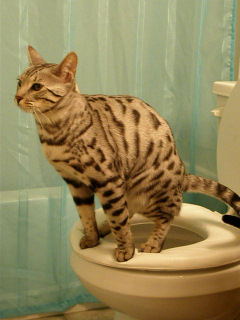Dangers of Flushing Cat Poop Down Your Toilet - Avoid Possible Problems
Dangers of Flushing Cat Poop Down Your Toilet - Avoid Possible Problems
Blog Article
On this page below you will find a lot of great advice in regards to How to Dispose of Cat Poop and Litter Without Plastic Bags.

Intro
As pet cat owners, it's important to be mindful of how we dispose of our feline buddies' waste. While it may seem hassle-free to purge cat poop down the bathroom, this method can have detrimental consequences for both the environment and human wellness.
Alternatives to Flushing
The good news is, there are much safer and a lot more liable methods to take care of feline poop. Think about the adhering to choices:
1. Scoop and Dispose in Trash
One of the most typical technique of dealing with feline poop is to scoop it right into a naturally degradable bag and toss it in the garbage. Make certain to make use of a specialized trash scoop and deal with the waste promptly.
2. Usage Biodegradable Litter
Go with naturally degradable feline trash made from materials such as corn or wheat. These trashes are eco-friendly and can be securely gotten rid of in the trash.
3. Bury in the Yard
If you have a yard, think about burying feline waste in an assigned location away from veggie yards and water sources. Be sure to dig deep enough to avoid contamination of groundwater.
4. Set Up a Pet Waste Disposal System
Buy an animal garbage disposal system specifically developed for cat waste. These systems utilize enzymes to break down the waste, reducing odor and environmental impact.
Health Risks
In addition to ecological worries, flushing feline waste can likewise posture health and wellness risks to people. Cat feces may consist of Toxoplasma gondii, a bloodsucker that can create toxoplasmosis-- a possibly extreme illness, especially for pregnant females and people with weakened body immune systems.
Environmental Impact
Flushing pet cat poop presents harmful virus and bloodsuckers right into the water supply, presenting a substantial risk to aquatic ecosystems. These impurities can negatively influence marine life and concession water top quality.
Final thought
Liable pet possession extends past providing food and shelter-- it likewise involves appropriate waste administration. By refraining from purging pet cat poop down the commode and going with alternative disposal methods, we can decrease our environmental footprint and secure human health.
Why You Should Never Flush Cat Poop Down the Toilet
A rose by any other name might smell as sweet, but not all poop is created equal. Toilets, and our sewage systems, are designed for human excrement, not animal waste. It might seem like it couldn’t hurt to toss cat feces into the loo, but it’s not a good idea to flush cat poop in the toilet.
First and foremost, assuming your cat uses a litter box, any waste is going to have litter on it. And even the smallest amount of litter can wreak havoc on plumbing.
Over time, small amounts build up, filling up your septic system. Most litter sold today is clumping; it is made from a type of clay that hardens when it gets wet. Ever tried to scrape old clumps from the bottom of a litter box? You know just how cement-hard it can get!
Now imagine just a small clump of that stuck in your pipes. A simple de-clogger like Drano isn’t going to cut it. And that means it’s going to cost you big time to fix it.
Parasitic Contamination
Believe it or not, your healthy kitty may be harboring a nasty parasite. Only cats excrete Toxoplasma in their feces. Yet it rarely causes serious health issues in the cats that are infected. Most people will be fine too if infected. Only pregnant women and people with compromised immune systems are at risk. (If you’ve ever heard how women who are expecting are excused from litter cleaning duty, Toxoplasma is why.)
But other animals may have a problem if infected with the parasite. And human water treatment systems aren’t designed to handle it. As a result, the systems don’t remove the parasite before discharging wastewater into local waterways. Fish, shellfish, and other marine life — otters in particular — are susceptible to toxoplasma. If exposed, most will end up with brain damage and many will die.
Depending on the species of fish, they may end up on someone’s fish hook and, ultimately on someone’s dinner plate. If that someone has a chronic illness, they’re at risk.
Skip the Toilet Training
We know there are folks out there who like to toilet train their cats. And we give them props, it takes a lot of work. But thanks to the toxoplasma, it’s not a good idea.

Hopefully you enjoyed our post on Don’t flush cat feces down the toilet. Many thanks for taking a few minutes to read our article post. Feel free to take the time to distribute this blog if you liked it. Thank-you for your time invested reading it.
Request Free Estimate Report this page